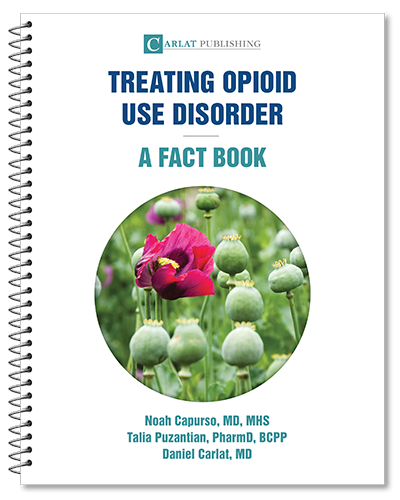Home » Does Extended-Release Naltrexone Worsen Psychiatric Symptoms?
Does Extended-Release Naltrexone Worsen Psychiatric Symptoms?
May 21, 2019
From The Carlat Addiction Treatment Report
Brian Frankel, MD.
Dr. Frankel has disclosed that he has no relevant financial or other interests in any commercial companies pertaining to this educational activity.
Review of: Latif Z et al, JAMA Psychiatry 2019;76(2):127–134
Extended-release (XR) naltrexone (Vivitrol) is an injectable version of naltrexone that lasts for 4 weeks and is FDA approved for opioid use disorder (OUD). Although effective, there is some concern that XR naltrexone may cause or worsen psychiatric symptoms because of its opioid blockade. Prior research has been mixed on this issue, and studies have been limited by not comparing XR naltrexone with an active control medication. This new study is the first to directly compare XR naltrexone with buprenorphine in terms of their effects on anxiety, depression, and insomnia.
The outpatient Norwegian study contained two components: a 12-week randomized controlled trial (RCT) and a 36-week follow-up study. In the RCT, 159 participants diagnosed with OUD were randomly assigned, but not blinded, to treatment with flexibly dosed daily buprenorphine/naloxone or monthly injections of XR naltrexone. At the end of 12 weeks, participants could choose treatment with buprenorphine/naloxone or XR naltrexone, and they were then followed for an additional 36 weeks.
Outcome measures included symptoms of anxiety, depression, and insomnia, as assessed by the Hopkins Symptom Checklist and the Insomnia Severity Index. These scales measure symptoms, but they are not diagnostic, and there was no mention of the prevalence and distribution of mood, anxiety, and sleep disorders between the groups.
The results showed that the two treatments were comparable. During the RCT component of this study, XR naltrexone was not significantly different than buprenorphine in terms of anxiety and depression symptoms, and it was slightly better than buprenorphine regarding insomnia symptoms (effect size -0.32; p = 0.008). There were no significant differences between groups in the follow-up component. Encouragingly, throughout all components of the study, anxiety, depression, and insomnia symptoms improved over time.
CATR’s Take
It appears that XR naltrexone does not worsen symptoms of anxiety, depression, or insomnia in people with OUD. When we are deciding between XR naltrexone and buprenorphine for OUD, the primary factors should be efficacy and patient access and preference.
Addiction TreatmentExtended-release (XR) naltrexone (Vivitrol) is an injectable version of naltrexone that lasts for 4 weeks and is FDA approved for opioid use disorder (OUD). Although effective, there is some concern that XR naltrexone may cause or worsen psychiatric symptoms because of its opioid blockade. Prior research has been mixed on this issue, and studies have been limited by not comparing XR naltrexone with an active control medication. This new study is the first to directly compare XR naltrexone with buprenorphine in terms of their effects on anxiety, depression, and insomnia.
The outpatient Norwegian study contained two components: a 12-week randomized controlled trial (RCT) and a 36-week follow-up study. In the RCT, 159 participants diagnosed with OUD were randomly assigned, but not blinded, to treatment with flexibly dosed daily buprenorphine/naloxone or monthly injections of XR naltrexone. At the end of 12 weeks, participants could choose treatment with buprenorphine/naloxone or XR naltrexone, and they were then followed for an additional 36 weeks.
Outcome measures included symptoms of anxiety, depression, and insomnia, as assessed by the Hopkins Symptom Checklist and the Insomnia Severity Index. These scales measure symptoms, but they are not diagnostic, and there was no mention of the prevalence and distribution of mood, anxiety, and sleep disorders between the groups.
The results showed that the two treatments were comparable. During the RCT component of this study, XR naltrexone was not significantly different than buprenorphine in terms of anxiety and depression symptoms, and it was slightly better than buprenorphine regarding insomnia symptoms (effect size -0.32; p = 0.008). There were no significant differences between groups in the follow-up component. Encouragingly, throughout all components of the study, anxiety, depression, and insomnia symptoms improved over time.
CATR’s Take
It appears that XR naltrexone does not worsen symptoms of anxiety, depression, or insomnia in people with OUD. When we are deciding between XR naltrexone and buprenorphine for OUD, the primary factors should be efficacy and patient access and preference.
Issue Date: May 21, 2019
Table Of Contents
Recommended
Newsletters
Please see our Terms and Conditions, Privacy Policy, Subscription Agreement, Use of Cookies, and Hardware/Software Requirements to view our website.
© 2025 Carlat Publishing, LLC and Affiliates, All Rights Reserved.


_-The-Breakthrough-Antipsychotic-That-Could-Change-Everything.jpg?1729528747)



